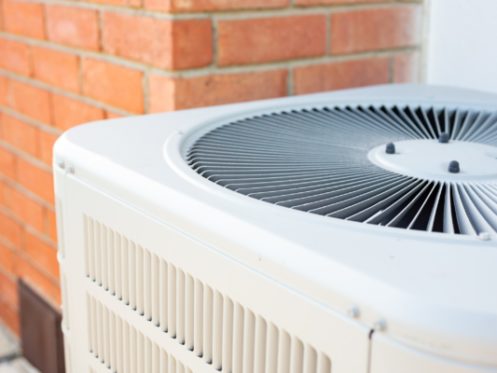Do California Winters Make HVAC Covers Necessary?
While summer in Roseville, California tends to be hot and arid, winter is usually cold, wet, and dreary. Although snow hardly falls in the region, winter temperatures and conditions can become severe enough to make your outside HVAC equipment a special concern. Whether you’ve got a heat pump condenser or an AC condenser to protect, purchasing or fashioning a cover for this unit might seem like the right idea. Keep reading to find out why it isn’t.
Condenser Covers Can Actually Harm Your HVAC Equipment
It isn’t difficult to find a reasonably priced and reasonably well-fitting cover for most air conditioners and heat pump condensers. Countless companies manufacture these products, and numerous consumers buy them. Unfortunately, if these covers aren’t used correctly, they can cause a tremendous amount of harm to HVAC equipment. Although people purchase condenser covers with the primary goal of protecting these units from rain and other forms of precipitation, condenser covers actually trap moisture in.
If you put a condenser cover on your heat pump or air conditioner’s outside component just before winter starts, you can’t leave this covering on all season long. The moisture that gets trapped beneath this cover will increase the likelihood of rust formation and other forms of corrosion. In fact, corrosion on a condenser that’s been covered for several months can be so widespread that the unit has to be replaced entirely. Moreover, poor ventilation under a heavy condenser cover will also increase the likelihood of mold.
The proper way to use condenser covers is by putting them on just before a major weather event. As soon as storms have passed, these covers should be taken off, dried, and put away. Removing condenser covers within just one to two days after putting them on is the best way to keep rust at bay. Once the condenser cover is off, air can flow through the unit, and trapped moisture will dry.
Condenser covers certainly aren’t without their merits. There are times when these covers can come in handy. However, it’s important to note that AC and heat pump manufacturers may strongly advise against using them in owner manuals, and they may outright forbid the use of condenser covers in their warranties. Checking these documents before putting a cover on your HVAC equipment is always a good idea.
Making Your Own Condenser Cover Is Incredibly Risky
If you can’t find a condenser cover that fits your unit, or if you can’t find one that’s reasonably priced, you may be tempted to make your own. There are a lot of homeowners in the Roseville area who run out and buy tarps or large sheets of plastic before winter rolls in. These are then used to wrap their heat pump or AC condensers from top to bottom so that no moisture can enter. Unfortunately, wrapping this tightly also means that no moisture can get out.
Self-made condenser covers are often worse for HVAC equipment than store-bought options. While a store-bought cover will invariably trap excess moisture inside of your condenser, it will at least have several air holes built into its design. Large tarps and large sheets of plastic do not. As such, these covers provide absolutely no ventilation at all.
Having Your Condenser Correctly Installed Is the Best Prevention
In Roseville, the most likely cause of condenser damage in the winter is falling objects. Even as they increase the likelihood of rust and mold development, store-bought, soft-sided condenser covers fail to protect condensers from impact-related damage. Fortunately, the potential for this damage is something that we account for when installing condensers.
Heat pump and AC condensers are usually installed inside yards just between the exterior walls of homes and property boundary fences. In this position, fencing protects the condenser on one side from windblown debris, and a fixed wall protects it on the other. In Roseville, this is usually all of the protection that condensers need. However, during rare cold snaps, you might want overhead protection from falling icicles. If you happen to have a tree on your property that sits just over your condenser, overhead coverage will keep this unit protected from broken tree branches and falling fruit, seeds, and cones.
Overhead protection is far different from the protection provided by soft-sided covers. If absolutely necessary, you can build a hard-sided structure around your AC or heat pump condenser that remains completely open on one side. This won’t impede normal airflow, but it will act as the first point of contact for heavy, falling items.
HVAC Equipment Manufacturers Account for Winter Weather
One of the most important things for homeowners to know about air conditioners and heat pump condensers is that they’re designed to withstand the natural elements. AC and heat pump manufacturers know that these units will be subjected to wind, rain, hail, and more. Condensers can face harsh winter weather throughout the entirety of their lifespans without sustaining any excessive or unanticipated wear. More importantly, when choosing HVAC equipment for our clients, we opt for models that are guaranteed to hold up well in the local climate.
How to Winterize Your Outdoor HVAC Equipment
Many of the best strategies for winterizing outdoor HVAC equipment don’t actually involve the equipment itself. The better that you care for your yard, your roof, and your trees, the less likely your condenser will be to sustain damage throughout the cold season. You should:
- Store all patio furniture
- Remove toys and other unmounted recreational items
- Limb your trees
- Make sure that your gutters are firmly attached
- Replace loose shingles on your roof
Putting away bikes, barbecue pits, and sandboxes will ensure that heavy items aren’t blown into your condenser by the wind.
Ongoing Winter HVAC Maintenance
During winter, it’s always a good idea to check on your condenser from time to time. Even if you’re careful to clean up your own yard, this doesn’t mean that your neighbors will be. Sticks, twigs, rocks, and other debris can get blown onto your side of the fence where they might bang into your condenser. At least once or twice each week, circle your unit’s perimeter, and clear these things away.
You should also schedule annual maintenance service before winter actually arrives. Although it’s best to have your air conditioner condenser inspected and tuned up before the cooling season, we can check this component out while servicing your heater. If there are any developing issues, we’ll take care of them right away so that they don’t fester or spiral out of control in the colder, wetter weather of winter. This is also a great opportunity to learn more about condenser covers and the best ways and times to use them. We can give you model-specific advice for protecting your condenser so that you aren’t using general preventative measures that don’t work well for the type of equipment you own.
Environmental Heating & Air Solutions has been a trusted provider of heating, cooling, and plumbing services since 2010. Residents of Roseville, California can also turn to us for advanced indoor air quality solutions, home zoning systems, and home automation. If you need help winterizing your AC or heat pump, call us now!

